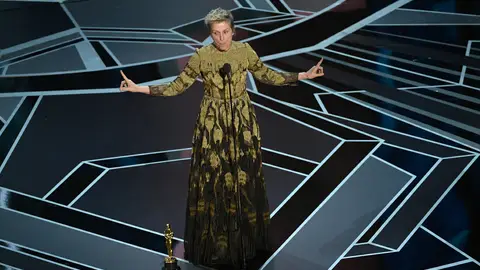What's An Inclusion Rider? A Breakdown Of Frances McDormand's Call To Action

Normally when we hear about riders, it has to do with the snacks a musician contractually requires backstage at every one of his tour stops, or the ambiance an actress contractually can't run lines without. Kanye West reportedly has two tubes of Carmex lip balm and a bar of L'Occitane soap at every show, while Christina Aguilera allegedly requests a foot masseur and votive candles backstage at The Voice.
But at the 2018 Oscars, Frances McDormand introduced us — and probably a lot of Hollywood elite — to a different kind of rider. At the end of her rousing Best Actress acceptance speech, after she set her Oscar on the floor beside her, asked every single female nominee in the room to stand up, and told her peers to look around at the women they need to set meetings with, McDormand offered her parting words, "I have two words to leave with you tonight, ladies and gentlemen: inclusion rider."
"Sorry, what was that?" the world collectively asked while scrambling to rewind their DVRs to see if they misheard the line.
Up until recently, McDormand, a 35-year industry veteran, was asking that very question. When she arrived in the press room backstage, the newly minted Best Actress immediately expanded on her two words. "I just found out about this last week," she began. "There is, has always been available to all — everybody that does a negotiation on a film — an inclusion rider, which means that you can ask for and/or demand at least 50 percent diversity in not only the casting, but also the crew."
So, rather than worry about what color M&Ms await backstage, an inclusion rider worries about the diversity of people on set. In a tweet, Whitney Cummings summed it up as "something actors put into their contracts to ensure gender and racial equality in hiring on movie sets."
Dr. Stacy Smith, founder and director of the Annenberg Inclusion Initiative at the University of Southern California, has been talking about the inclusion rider, or equity rider, for years after studying trends in on-screen representation.
She described her findings during a 2016 TED Talk, revealing that of the top 100 highest-grossing films in the U.S. from 2007 through 2015, less than one-third of speaking roles went to women. Of the top 100 films of 2015, 48 didn't feature one black or African-American character with a speaking role, 70 didn't have a speaking Asian or Asian-American female character, 84 didn't show a female with a disability, and 93 lacked female LGBT characters with a speaking role.
If more of Hollywood's leading men and women would incorporate an inclusion rider into their negotiations alongside their requests for fresh-squeezed orange juice, we just may begin to see the colorful, cultural, beautiful world in which we truly live reflected in all of our favorite TV shows and movies.





